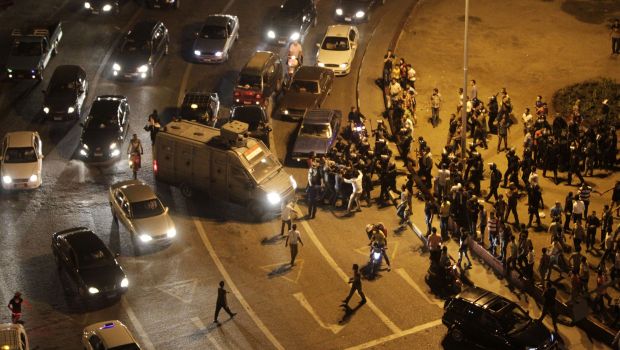
Riot policemen clash with protesters during a rally in support of Egypt’s ousted President Mohamed Mursi in Cairo’s Tahrir Square October 1, 2013. (REUTERS/ Mohamed Abd El Ghany)
Cairo, Asharq Al-Awsat—Egyptian Prime Minister Hazem El-Beblawi said that the government will consider reviewing a controversial draft for a new law governing the right to protest.
Critics of the draft law say it criminalizes legitimate acts of protest, and goes too far in giving the interior minister the power to ban protests.
Speaking during a TV interview on Sunday, Beblawi said that the government will continue to work on promoting dialogue within society even if expected protest and anti-terror laws are delayed until after November 14, the date when the existing state of emergency is set to expire.
The state of emergency allows the security forces to take extraordinary measures, including stop and search or holding suspects without a warrant.
Egypt has seen violent incidents and a wave of protests since the authorities used force to disperse pro-Mursi protests in Cairo on August 14. Interim President Adly Mansour declared a state of emergency for one month, subsequently extended for two more months. It is currently unclear whether Mansour will extend the state of emergency further.
The constitutional declaration announced by Mansour on July 8 stipulates that the president can declare a state of emergency for three months which he can only extend once for a similar period, following a public referendum.
A state of emergency lasting three decades was imposed during the rule of former President Hosni Mubarak, but was subsequently suspended during the Mursi administration, although the Islamist president did declare a short-lived state of emergency in the Suez Canal cities following widespread violence.
Meanwhile, Deputy Prime Minister Ziad Bahaa El-Din, who criticized the proposed Protest Law in a cabinet meeting, has called for public debate on the issue. Bahaa El-Din yesterday started a series of meetings with different political groups to discuss the matter.
While the government works to overcome criticism of the proposed legislation, Egypt’s 50-member constitutional drafting committee is preparing to vote on an initial draft of the new constitution in meetings taking place behind closed doors on Tuesday.
The committee is divided over controversial articles related to the army and the position of Islamic Sharia in the constitution, despite the fact that subcommittees are reportedly close to resolving their differences.
Fears have grown over the media blackout imposed by the committee on the initial discussions; the decision of the constitutional committee’s secretariat to exclude non-voting members from Tuesday’s general session has been widely condemned.
Sources inside the committee say that a number of non-voting members have raised the issue of their exclusion with the committee’s chairman, Amr Moussa, in light of the fact that many of them had participated in discussions of many constitution articles within the subcommittees.
Moussa, however, reportedly told them the decision was final, adding that “The regulations allow only the 50 main members the right to vote.”
